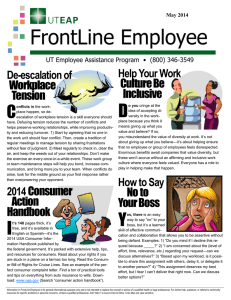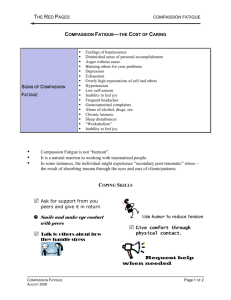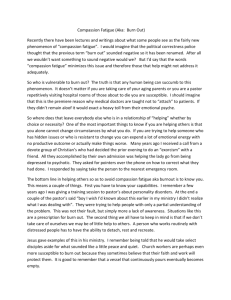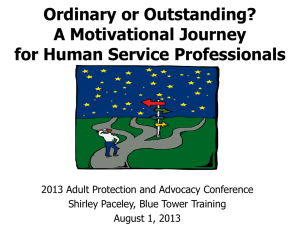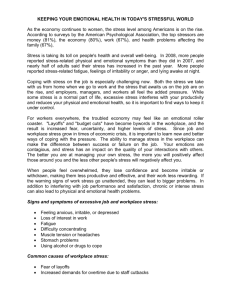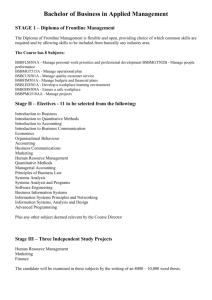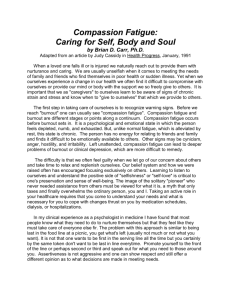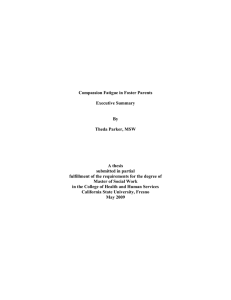Wellness, Productivity, & You!
advertisement
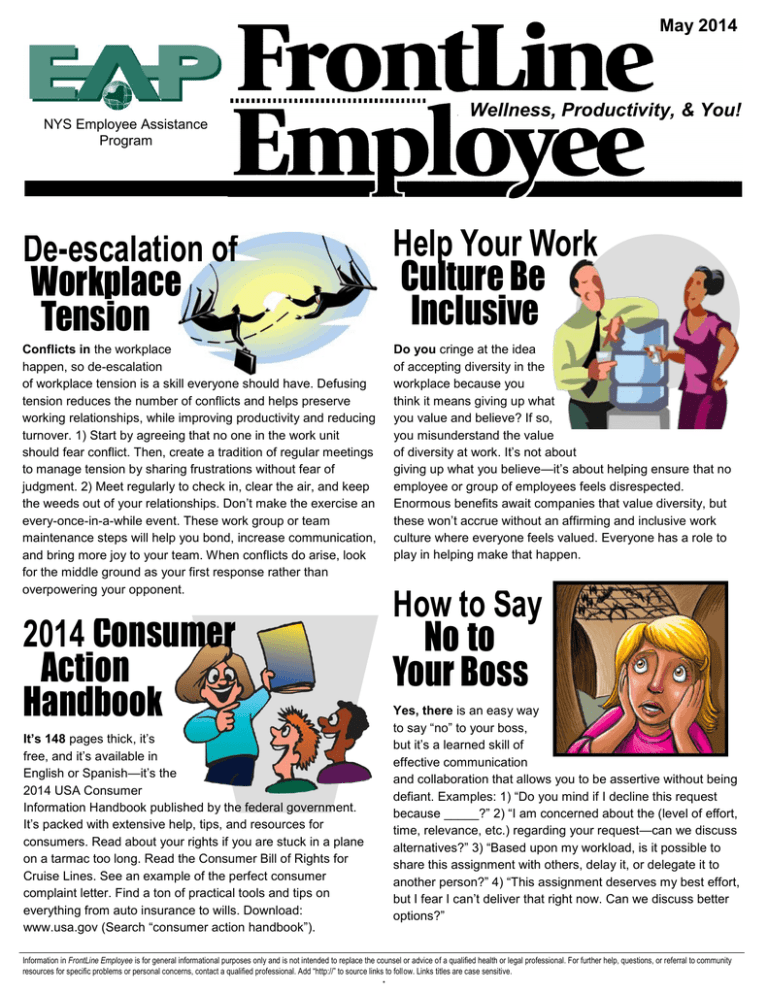
May 2014 Wellness, Productivity, & You! NYS Employee Assistance Program www.worklife.ny.gov/eap De-escalation of Workplace Tension Help Your Work Culture Be Inclusive Conflicts in the workplace happen, so de-escalation of workplace tension is a skill everyone should have. Defusing tension reduces the number of conflicts and helps preserve working relationships, while improving productivity and reducing turnover. 1) Start by agreeing that no one in the work unit should fear conflict. Then, create a tradition of regular meetings to manage tension by sharing frustrations without fear of judgment. 2) Meet regularly to check in, clear the air, and keep the weeds out of your relationships. Don’t make the exercise an every-once-in-a-while event. These work group or team maintenance steps will help you bond, increase communication, and bring more joy to your team. When conflicts do arise, look for the middle ground as your first response rather than overpowering your opponent. Do you cringe at the idea of accepting diversity in the workplace because you think it means giving up what you value and believe? If so, you misunderstand the value of diversity at work. It’s not about giving up what you believe—it’s about helping ensure that no employee or group of employees feels disrespected. Enormous benefits await companies that value diversity, but these won’t accrue without an affirming and inclusive work culture where everyone feels valued. Everyone has a role to play in helping make that happen. How to Say No to Your Boss 2014 Consumer Action Handbook Yes, there is an easy way to say “no” to your boss, but it’s a learned skill of effective communication and collaboration that allows you to be assertive without being defiant. Examples: 1) “Do you mind if I decline this request because _____?” 2) “I am concerned about the (level of effort, time, relevance, etc.) regarding your request—can we discuss alternatives?” 3) “Based upon my workload, is it possible to share this assignment with others, delay it, or delegate it to another person?” 4) “This assignment deserves my best effort, but I fear I can’t deliver that right now. Can we discuss better options?” It’s 148 pages thick, it’s free, and it’s available in English or Spanish—it’s the 2014 USA Consumer Information Handbook published by the federal government. It’s packed with extensive help, tips, and resources for consumers. Read about your rights if you are stuck in a plane on a tarmac too long. Read the Consumer Bill of Rights for Cruise Lines. See an example of the perfect consumer complaint letter. Find a ton of practical tools and tips on everything from auto insurance to wills. Download: www.usa.gov (Search “consumer action handbook”). Information in FrontLine Employee is for general informational purposes only and is not intended to replace the counsel or advice of a qualified health or legal professional. For further help, questions, or referral to community resources for specific problems or personal concerns, contact a qualified professional. Add “http://” to source links to follow. Links titles are case sensitive. . May 2014 FrontLine Employee Compassion Fatigue: Don’t Wait to Feel It Is Social Media Controlling You? Compassion fatigue is a syndrome similar to burnout that includes physical, emotional, and spiritual depletion. In work settings, it is usually associated with nursing and direct care of those suffering with medical, emotional, and emergency health issues. Few professionals believe from the outset that they will ever fall victim to compassion fatigue, because it’s counterintuitive—a profession of helping others is supposed to bring joy, not pain. A scan of the literature shows common themes of self-care and self-awareness, or seeking worklife balance to fight symptoms. What gets less attention is upstream preventative maintenance to remain at low risk. As with most health and wellness issues, we tend to wait for symptoms to appear before taking action. Reduce your vulnerability to compassion fatigue by taking proactive measures. Realize that prevention is not a mindover-matter exercise. Your enthusiasm and commitment help, but they will not sustain you and insulate you from the effects of repeated exposure to acute-care medical trauma and suffering. Find compassion fatigue workbooks, exercises, and loads of insight by searching “compassion fatigue” at bookstores or online, and avoid losing the love of what you do best. Are social networking utilities like Facebook and digital communication tools like texting leading users to experience a phenomenon called “social distancing”? Social distancing is detachment, resistance, or avoidance of traditional forms of human personal interaction like using the phone or talking face-to-face. Social media can make it easier and more convenient to avoid interacting with nonverbal cues, listening, processing feelings, interpreting voice tone, and engaging in other aspects and features of human communication. As you see people, especially younger generations, depending more on social media, you may wonder if social distancing is something that affects you or others you know. Here’s the fix: Think about choices when communicating with others in relationships you value at work and elsewhere. Decide first what form of communication will enhance your relationship, not just how the “data” should be “transmitted.” Think about how to control technology to help prevent it from controlling you. wwwwashington.cbslocal.com (Search “social distancing”). More Fun at Work Fun inspires positive expectations in the workplace, and in turn this affects productivity and the bottom line. To have more fun at work, take action by forming a team of interested coworkers —a “Fun Committee”—to brainstorm and plan how to make the goal come to life. First, decide what fun means in your workplace, what’s missing, and what kind of activities fit with the work culture. Fun doesn’t mean a carnival, but it does mean reducing stress and negativity, increasing the number of pleasant interactions, improving productivity, and laughing more. With a whiteboard and some brainstorming, your team’s ideas will flow. Don’t just plan a day— plan a year of events, celebrations, and other things to do and experience. Within a couple of years, if not sooner, you’ll reshape your work culture, see productivity improve, and possibly reduce turnover. Take charge of change, and for inspiration, check out online bookstores or your local bookstore or library. . Domestic Abuse: At Least Tell a Friend Few people in domestic relationships take action the moment they realize they are being abused. Even if physically assaulted, victims may struggle to understand the cause and may analyze circumstances and take a wait-and-see approach. Some victims blame themselves. Others feel ashamed and convince themselves they deserved it. Years may pass before a victim reaches out. If this sounds familiar, break the silence. At least tell a close friend. Don’t keep it a secret or exert effort to draw away suspicion that you’re in trouble and feel trapped. Experience shows that breaking this silence is the first step, which can lead you to the next step: getting help from resources standing by and ready to help, like hotlines, safe shelters, or the police—any of which could save your life.
